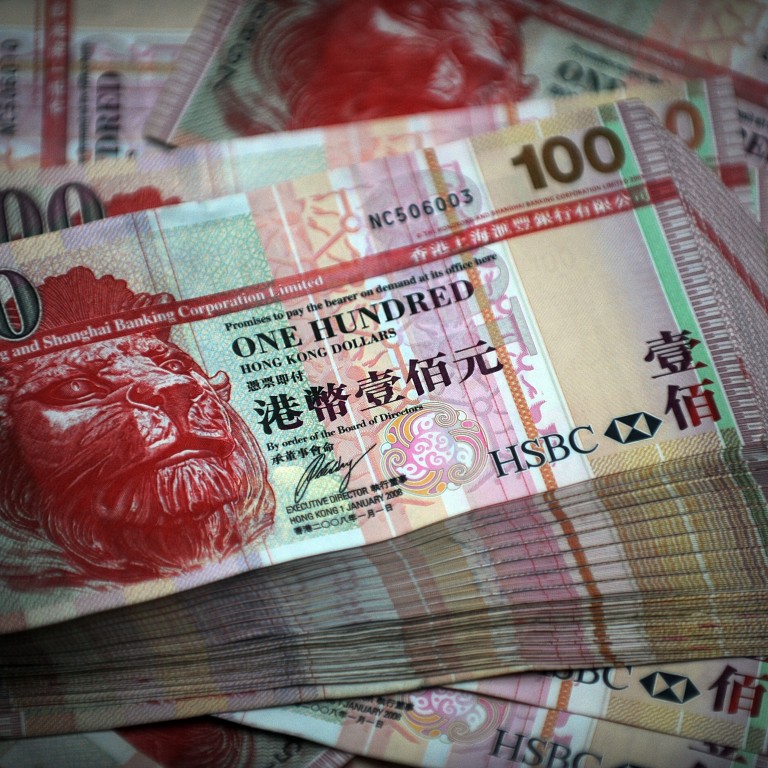
Why Hong Kong still needs to peg its currency to US dollar
The Hong Kong Monetary Authority’s billion-dollar intervention to defend the Hong Kong dollar peg to the US dollar last week has reignited the debate on the city’s 32-year-old currency peg.
Bankers and analysts in general believe de-pegging from the US dollar is not an option. The only reason for the Hong Kong dollar to lose its peg to the US dollar would be to peg itself to the yuan and it’s too early for that.
Wilson Chan Fung-cheung, senior consultants at Hong Kong Institute of Bankers, said an unpegging at this point would mean the HKMA would not have to intervene, saving a lot of money.
“However, this may create more problems it solves,” Chan said, adding that a de-pegged Hong Kong dollar would have two choices for free floats. These are, being pegged to a basket of currency like the Singapore dollar, or being pegged to the yuan.
“The Hong Kong economy is too small to adapt to a free float. A currency-basket system lacks transparency. A peg with the yuan will not happen in the near future as the currency is not yet freely convertible,” Chan said.
BNP economist Mole Hau said in a report that in the long run, the Hong Kong dollar’s link to the US dollar is likely to be replaced by a link to the onshore yuan or the Hong Kong dollar being replaced by the yuan itself.
“However, any such shift remains highly unlikely in the foreseeable future,” Hau said, pointing there would be practical problems to peg with the yuan.
“If the Hong Kong dollar were to be re-pegged to the yuan, it would need over 2 trillion yuan worth of assets to replace the HKMA’s US$340 billion in foreign reserves, which exceeds the amount of existing yuan assets in Hong Kong’s offshore market.”
The Hong Kong economy is too small to adapt to a free float. A currency-basket system lacks transparency. A peg with the yuan will not happen in the near future as the currency is not yet freely convertible
According to figures from the HKMA, as of the end of last year, yuan deposits and certificates of deposits stood at 1.158 trillion yuan while outstanding yuan bonds amounted to 381 billion and yuan-denominated loans stood at 188 billion.
Hau said the Hong Kong dollar should be pegged with the yuan only if that currency is fully convertible given Hong Kong’s role as a major financial centre.
“The inclusion of the CNY in the IMF’s Special Drawing Rights basket could be seen as a confirmation of the currency on the path towards that end,” he said.
The HKMA authority until Monday had intervened in the foreign exchange market five times in the past week, spending a combined HK$48.78 billion to weaken the local currency that continued to hit the top end of the trading band at 7.75.
The Hong Kong dollar has been linked with the US dollar at 7.8 since 1983. The HKMA is required to intervene whenever the currency trades beyond the band of 7.75 to 7.85.
Bankers believe more intervention is needed as the Hong Kong dollar continues to trade near the strong end of the band as many depositors have been changing their offshore yuan to Hong Kong dollar in anticipation of more devaluation of the yuan, which fell 3 per cent last month.
This is not the first time the monetary authority has had to spend some of its HK$3.27 trillion Exchange Fund to defend the peg, but previous interventions were related more to hot money inflow.
In April, it intervened 12 times during a stock market rally from April 9 to April 27, spending HK$71.49 billion. Hot money flowing into the stock market then pushed up average daily market turnover to triple the usual amounts, to HK$200 billion.
“As history repeatedly shows, the Hong Kong authorities are willing to absorb substantial short-term pain to hold the peg and maintain the currency board’s credibility,” Hau said.
“A one-off devaluation against the USD is also unlikely, with costs likely to exceed benefits. Re-pegging against the USD at a different rate after 32 years would destabilise expectations and behaviour. If it ain’t broke, don’t expect it to be fixed anytime soon,” he added.
An AXA report also said a de-pegging is unlikely.
“We think the chance of an imminent HK dollar de-peg is very low. Hong Kong has a very strong FX reserve position, which amounts to US$340 billion or 120 per cent of GDP,” the AXA report said.
It also pointed out the HKMA has a large foreign exchange swap line with the PBOC of up to 400 billion yuan.
“In an emergency situation, such as a speculative attack, the HKMA can tap the swap line and use the extra liquidity provided by the PBOC to fend off speculators,” AXA said.

